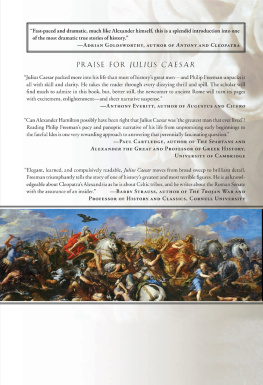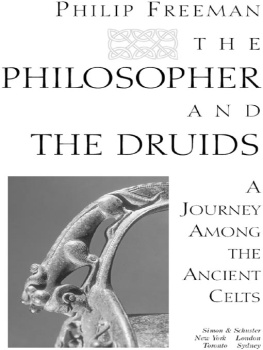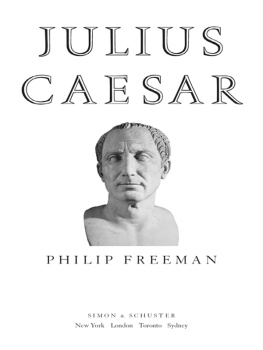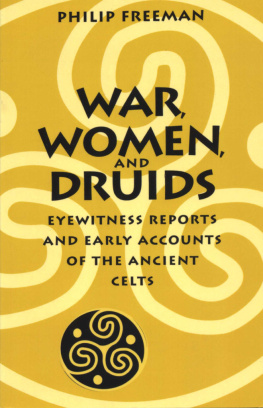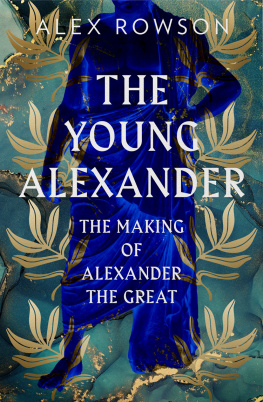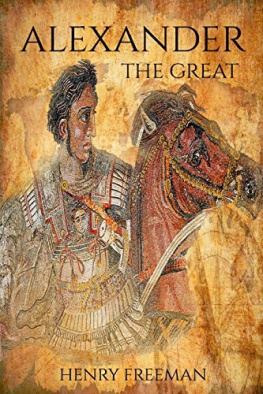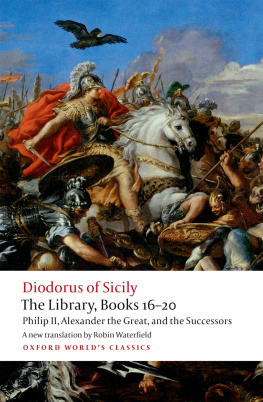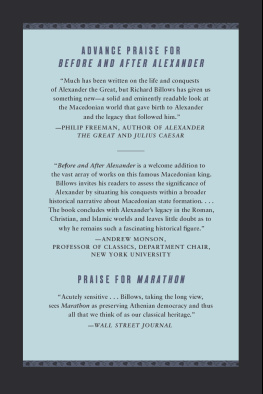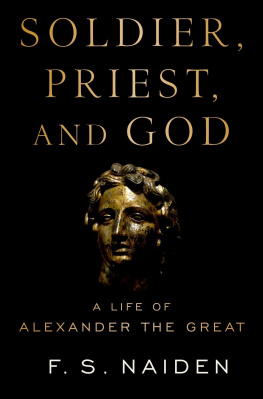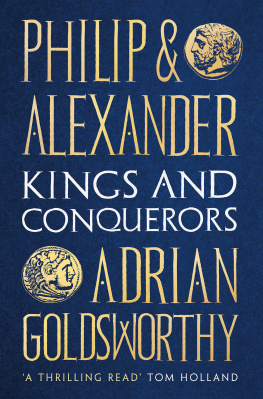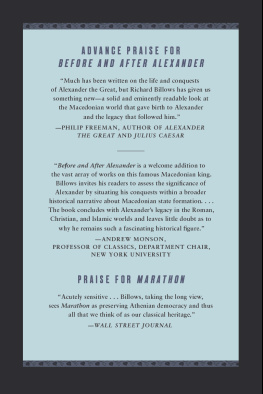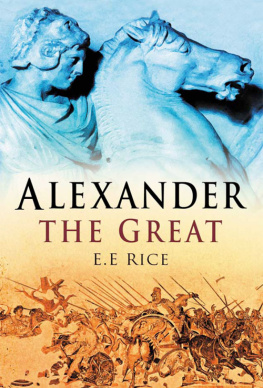
ALSO BY PHILIP FREEMAN
Julius Caesar
The Philosopher and the Druids: A Journey Among the Ancient Celts
St. Patrick of Ireland: A Biography
War, Women, and Druids: Eyewitness Reports and Early
Accounts of the Ancient Celts
The Galatian Language: A Comprehensive Survey of the
Language of the Ancient Celts in Greco-Roman Asia Minor
Ireland and the Classical World
Lecture Notes: A Professors Inside Guide to College Success

| Simon & Schuster
1230 Avenue of the Americas
New York, NY 10020
www.SimonandSchuster.com |
Copyright 2011 by Philip Freeman
All rights reserved, including the right to reproduce this book or portions thereof in any form whatsoever. For information address Simon & Schuster Subsidiary Rights Department, 1230 Avenue of the Americas, New York, NY 10020.
First Simon & Schuster hardcover edition January 2011
SIMON & SCHUSTER and colophon are registered trademarks of Simon & Schuster, Inc.
The Simon & Schuster Speakers Bureau can bring authors to your live event. For more information or to book an event, contact the Simon & Schuster Speakers Bureau at 1-866-248-3049 or visit our website at www.simonspeakers.com.
Designed by Nancy Singer
Maps by Paul J. Pugliese
Manufactured in the United States of America
10 9 8 7 6 5 4 3 2 1
Library of Congress Cataloging-in-Publication Data
Freeman, Philip, 1961
Alexander the Great / Philip Freeman.1st Simon & Schuster hardcover ed.
p. cm.
Includes bibliographical references and index.
1. Alexander, the Great, 356323 B.C. 2. GeneralsGreece-BiographyJuvenile literature 3. GreeceKings and rulersBiographyJuvenile literature. 4. GreeceHistoryMacedonian Expansion, 359323 B.C.Juvenile literature. I.Title.
DF234.F74 2011
938.07092dc22
[B]
2010027711
ISBN 978-1-4165-9280-8
ISBN 978-1-4391-9328-0 (ebook)
FOR MY STUDENTS
TIMELINE
All dates in this book are B.C. (B.C.E.) unless otherwise noted
559 Cyrus the Great becomes king of Persia
490 First Persian invasion of Greece, battle of Marathon
480 Second Persian invasion of Greece, battle of Thermopylae
431 Peloponnesian War begins
404 Peloponnesian War ends
359 Philip ascends to throne of Macedonia
356 Birth of Alexander (July)
343 Aristotle arrives in Macedonia as Alexanders tutor
338 Philip victorious at battle of Chaeronea; Alexander visits Athens; Alexander goes into exile
337 League of Corinth meets, authorizes invasion of Persian Empire
336 Darius III becomes king of Persia; Alexander returns from exile; murder of Philip; ascension of Alexander to throne of Macedonia
335 Alexander campaigns on the Danube; revolt and destruction of Thebes
334 Alexander crosses into Asia Minor; battle of the Granicus; capture of Miletus and Halicarnassus
333 Episode of the Gordion Knot; battle of Issus
332 Siege of Tyre; capture of Gaza; Alexander enters Egypt
331 Alexander visits oracle at Siwa; battle of Gaugamela; Alexander enters Babylon
330 Persepolis captured and burned; death of Darius; conspiracy of Philotas
329 Alexander crosses the Hindu Kush, reaches the Oxus River, advances to Samarkand; defeat of Bessus
328 Murder of Cleitus the Black
327 Marriage to Roxane; pages conspiracy; Alexander invades India
326 Battle of the Hydaspes; death of Bucephalas; mutiny on the Hyphasis
325 Alexander reaches the sea; march through the Gedrosian desert; voyage of Nearchus and the fleet
324 Alexander returns to Persia; mass marriages at Susa; death of Hephaestion
323 Alexander returns to Babylon; death of Alexander in June
MACEDONIAN KINGS
| Amyntas I | ?c. 498 |
| Alexander I | c. 498c. 454 |
| Perdiccas II | c. 454413 |
| Archelaus | 413399 |
| Orestes | 399c. 398 |
| Aeropus II | c. 398c. 395 |
| Amyntas II | 395394 |
| Amyntas III | 393c. 370 |
| Alexander II | c. 370367 |
| Ptolemy | 367365 |
| Perdiccas III | 365359 |
| Philip II | 359336 |
| Alexander the Great | 336323 |
PERSIAN KINGS
| Cyrus the Great | 559530 |
| Cambyses II | 530522 |
| Bardiya | 522 |
| Darius I | 522486 |
| Xerxes I | 486465 |
| Artaxerxes I | 465424 |
| Xerxes II | 424 |
| Darius II | 424404 |
| Artaxerxes II | 404359 |
| Artaxerxes III | 359338 |
| Artaxerxes IV | 338336 |
| Darius III | 336330 |
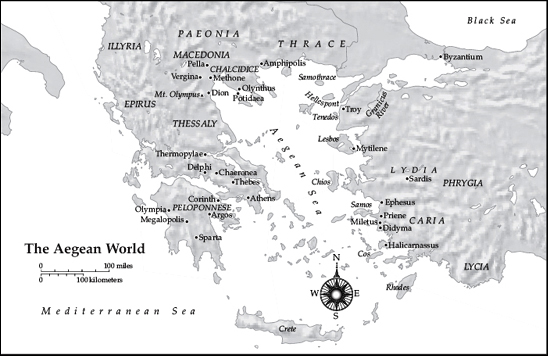
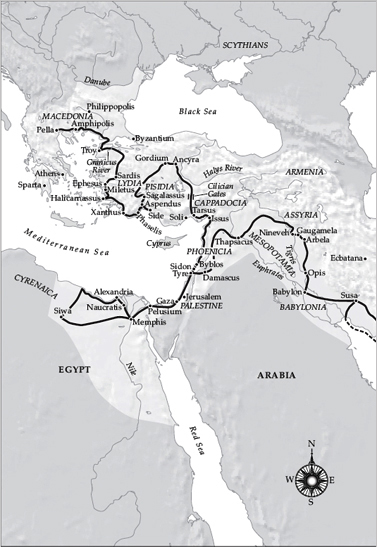
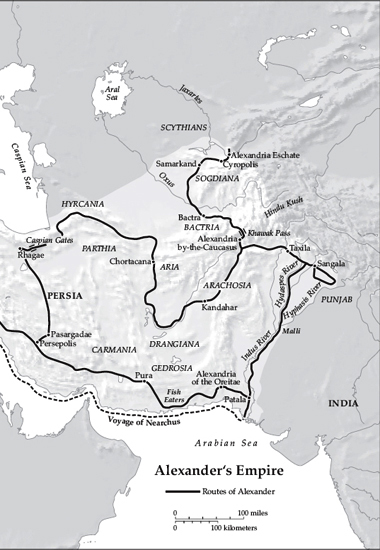
AUTHORS NOTE AND
ACKNOWLEDGMENTS
IF ANYONE IS SURPRISED THAT I HAVE WRITTEN
ON THIS SUBJECT EVEN THOUGH SO MANY
HISTORIANS BEFORE ME HAVE ALREADY DONE SO,
I WOULD ASK THEM TO LOOK AT ALL THE OTHER
BOOKS FIRST AND THEN READ MINE.
ARRIAN
The ancient Greek historian Arrian believed that his biography of Alexander the Great was unique and surpassed all previous works on the life of the Macedonian king. I make no such claims for my book. There are hundreds of excellent studies available on all aspects of Alexanders life, along with several comprehensive academic biographies in print that surpass mine in detail and technical argument. Why then another book on Alexander? The answer is partially selfish. I grew up fascinated by this man, so I couldnt resist the opportunity to immerse myself in the ancient and modern sources on his life, to visit sites along his journey, and to imagine him racing his horse Bucephalas across the plains of Macedonia or crossing the deserts and mountains of Iran and Afghanistan. But most important, I wanted to write a biography of Alexander that is first and foremost a story. My hope is that this narrative is authoritative and yet accessible to those who love history but may never have read a book about Alexanders life and are not experts on the ancient world.
My search for Alexander was encouraged by many friends and helpers. My colleagues at Luther College have been wonderfully supportive as I researched and wrote the book. The patient counsel of Jolle Delbourgo guided me through the world of publishing, while my editor Bob Bender, his assistant Johanna Li, and Philip Metcalf at Simon & Schuster saved me from countless mistakes. The libraries at Luther College, Bowdoin College, and Harvard University graciously helped me find the resources I needed. My local guides were most generous in sharing their knowledge as I followed Alexanders footsteps, especially Katikiotes Lazaros in Greece, Osama Iskander in Egypt, and Mine Karahan in Turkey. My wife, Alison, as always was my greatest helper and favorite photographer. Finally, to my students who cheerfully suffered through my ancient history courses and never complained when I made them read just one more book or visit one more museum, my eternal gratitude.
Next page
